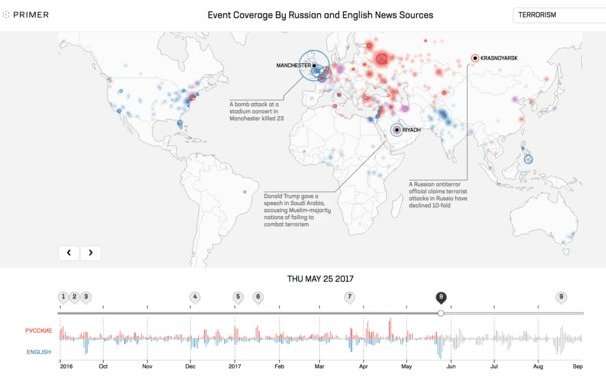October 26, 2017 weblog
AI is unleashed to sift through data piles for readable reports

Bitcoin. Self-driving cars. Sea levels. CO2 removal. Breast cancer. Wheat forecasts. Factory riots. The flood of data and research is daunting thanks to a knowledge world turned digital.
"The amount of data we are collecting is growing exponentially. At the same time the number of human analysts who can read it is at best growing linearly. We require new ways to close this intelligence gap," says a new startup with a solution to offer.
Daniel Terdiman, Fast Company, reported Tuesday that Primer is coming out of stealth.
Primer is the artificial intelligence startup. It is an analyst "in software form, scanning news stories and other massive data stores to report back on trends and important insights," said Business Insider. It can go through "massive troves of data and report back with the insights it gleans."
The startup describes itself as a "machine intelligence company that uses machine learning and natural language processing to automate the analysis of large datasets."
The company site said they can handle English, Chinese, and Russian as input and output. They said that more languages were on the way.
Primer appears to be on to a tool that does not replace the human analyst; just the preliminary grunt work connecting dots and getting up to speed.
Rob Verger, Popular Science quoted Sean Gourley, Primer's founder and CEO. Maybe the analyst has to monitor a data feed coming through and try to pick out the significant events in a region. Or, rapidly learn about "a new organization, or new part of the world that you've been called into, to quickly become an expert."
Visualization on steroids: Analysts who use it for support can see at a glance daily hotspots. They can assemble the most important pieces of information in so much unstructured data.
Daniel Terdiman in Fast Company described a machine learning system that can quickly search through "tens of millions of data sources–news articles, academic papers, social media posts, and so on."
He said the kind of information brought to the surface is the kind that is essential to intelligence analysts and corporate analysts." Gourley: "We like humans telling us stories, but we also like machines telling us stories at scale we can't."
Scale and time factor were highlighted at several sites looking at the startup. Essentially, they said the technology can pull off in seconds what takes a human days. Primer's tools can generate reports in between 5 to 30 minutes, said Terdiman.
How it works: "Users feed Primer's software a stream of documents, and it automatically summarizes what it determines to be the most important information out of that haystack of data. Users are then able to filter by topic, event, and other categories to drill down into the information Primer collected so they can go beyond the automatically generated headlines," wrote Blair Hanley Frank in VentureBeat.
Popular Science commented on the efficiency of it all, saying "you couldn't have a human translate every Facebook post or comment from one language into another, nor would you want someone sorting through photographs looking for cat pics. Instead, researchers train algorithms and neural networks by feeding them data and letting them learn from it."
Having said that, Gourley is not proposing his tool should replace humans. It's doing the junior grunt work; the rest is up to the people who receive and relay the information.
Rob Verger in Popular Science described how their tool helps.
"In short, the AI is creating the initial version of a report." He quoted Gourley:
"We want to be able to take that process, and write that first draft," he adds, "so that the analyst, when they sit down, instead of being confronted by a stream of hundreds of documents, is confronted by a draft of a report that they can ultimately edit themselves."
John Mannes in TechCrunch: "Primer's software is being positioned to augment low-level analyst work that manifests itself most commonly in the intelligence community and at big banks. By monitoring large quantities of information semiautonomously, Primer can potentially speed up the process by which research is gathered and presented."
Note that earlier, in July, Barry Libert and Megan Beck had made this distinction in Harvard Business Review. They said, "consultants provide insightful advice and guidance. However, a great deal of what is paid for with consulting services is data analysis and presentation. Consultants gather, clean, process, and interpret data from disparate parts of organizations. They are very good at this, but AI is even better."
© 2017 Tech Xplore



















